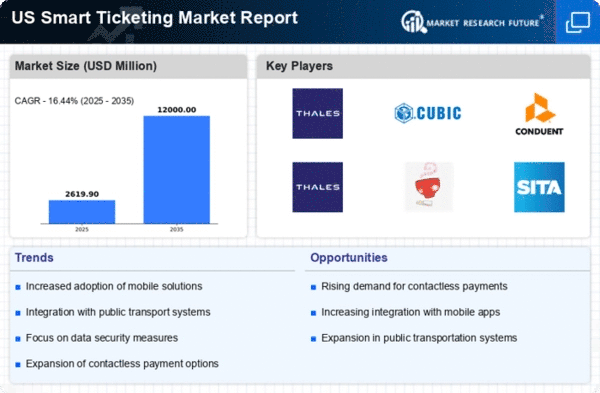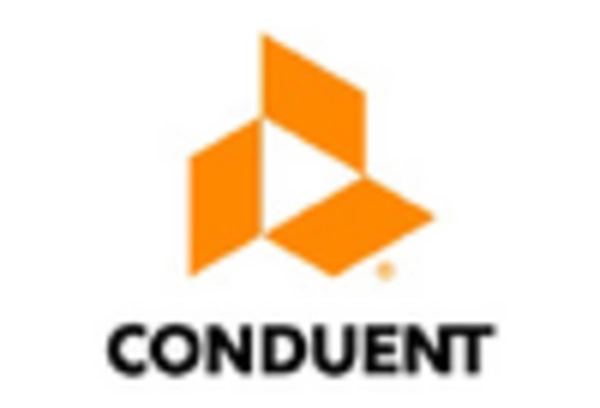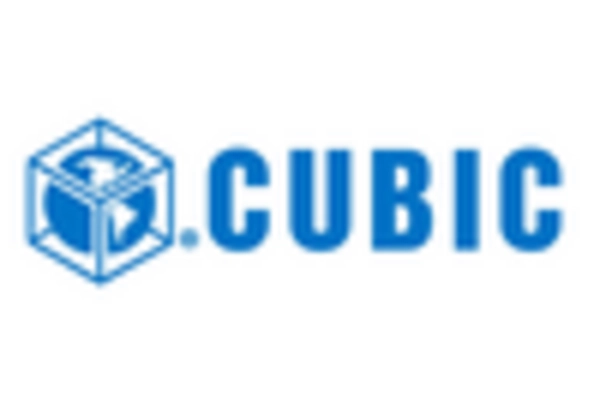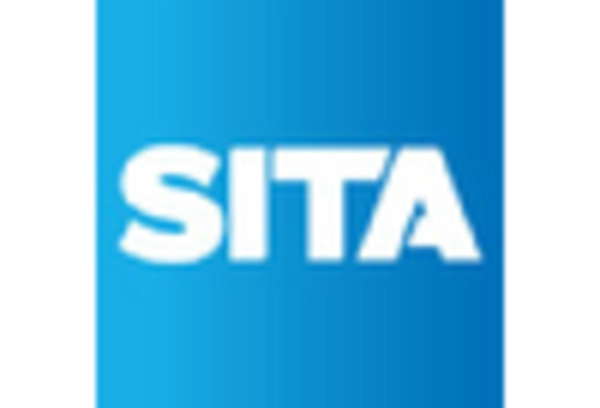Government Initiatives and Funding
Government initiatives play a vital role in the expansion of the smart ticketing market. Various federal and state programs are being implemented to promote the adoption of smart ticketing solutions, particularly in public transportation. Funding opportunities are increasingly available for transit agencies to upgrade their ticketing systems, which can lead to improved efficiency and user experience. For example, the Federal Transit Administration has allocated millions in grants to support the implementation of advanced ticketing technologies. This financial backing not only encourages innovation but also facilitates the transition to more sustainable and efficient transport systems. As a result, government initiatives and funding are significant drivers in the smart ticketing market, fostering an environment conducive to growth and modernization.
Increased Focus on Data Security and Privacy
As the smart ticketing market expands, concerns regarding data security and privacy are becoming increasingly prominent. With the rise of digital ticketing solutions, the protection of personal and financial information is paramount. Consumers are more aware of data breaches and are demanding robust security measures from service providers. Consequently, companies in the smart ticketing market are investing heavily in cybersecurity technologies to safeguard user data. This focus on data security not only builds consumer trust but also complies with regulatory requirements, which are becoming more stringent. The emphasis on data protection is likely to drive innovation in the market, as businesses seek to implement advanced security protocols. Thus, the increased focus on data security and privacy is a critical driver for the smart ticketing market.
Growing Demand for Seamless Travel Experiences
Consumer expectations for seamless travel experiences are significantly influencing the smart ticketing market. As urban mobility evolves, passengers increasingly seek integrated solutions that simplify their journeys. The demand for multi-modal transport options, where a single ticket can cover various modes of transport, is on the rise. This trend is reflected in the increasing partnerships between transport authorities and technology providers, aiming to create unified ticketing systems. Recent statistics indicate that approximately 60% of travelers prefer integrated ticketing solutions, highlighting the necessity for operators to adapt. The smart ticketing market is thus responding to this demand by developing systems that enhance convenience and accessibility, ultimately improving customer satisfaction and loyalty. This growing demand for seamless travel experiences is a crucial driver for the smart ticketing market.
Rising Urbanization and Public Transport Usage
The ongoing trend of urbanization is significantly impacting the smart ticketing market. As more individuals migrate to urban areas, the demand for efficient public transportation systems is escalating. This shift necessitates the implementation of smart ticketing solutions that can handle increased passenger volumes and provide real-time data on transport availability. Recent studies indicate that urban areas are expected to see a 30% increase in public transport usage by 2030, further emphasizing the need for advanced ticketing systems. Smart ticketing solutions not only enhance operational efficiency but also improve the overall travel experience for commuters. As urbanization continues to rise, the smart ticketing market is poised to benefit from this trend, making it a vital driver for future growth.
Technological Advancements in Ticketing Solutions
The smart ticketing market is experiencing a surge due to rapid technological advancements. Innovations in mobile applications, cloud computing, and data analytics are transforming how tickets are purchased and validated. For instance, the integration of artificial intelligence and machine learning enhances user experience by personalizing ticket offerings and streamlining operations. According to recent data, the market is projected to grow at a CAGR of 15% from 2025 to 2030, driven by these technological improvements. As systems become more sophisticated, they offer enhanced security features, reducing fraud and increasing consumer trust. This evolution in technology not only benefits consumers but also operators, who can optimize their revenue streams and operational efficiency. Thus, the ongoing technological advancements are a pivotal driver in the smart ticketing market.
















